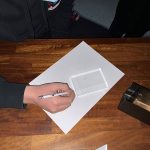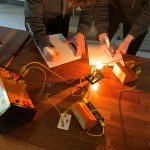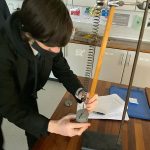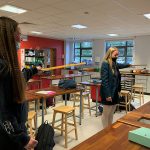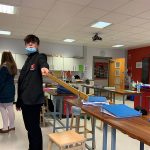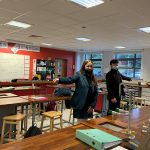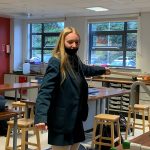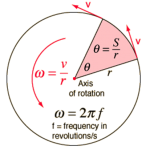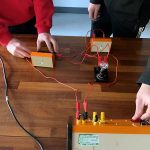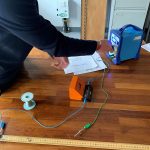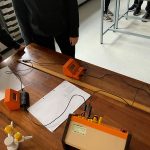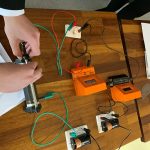Physics
Aims And Vision
Physics stimulates and excites pupils’ curiosity and their interest in, and knowledge of, phenomena and events of the world around them.
Our aims are:
- To provide pupils with opportunities to acquire knowledge and understanding of major scientific ideas;
- To develop and equip pupils with scientific and practical skills needed to explore the scientific world;
- To appreciate the relevance Physics in an increasingly changing technological, cultural and economic world and help them contribute to its worldwide development;
- To encourage pupils to become independent learners;
- To maximise the potential of pupils, and assist their transition to tertiary level education;
- To provide a safe and learning environment.
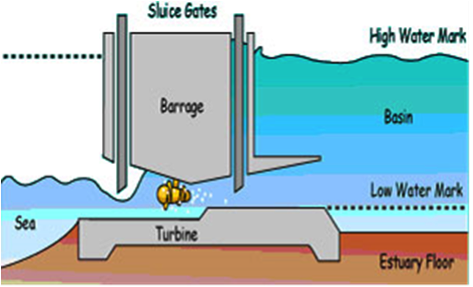
Magazine Articles
Banbridge Academy Magazine 2019-2020: Physics Article
Banbridge Academy Magazine 2020-2021: Physics Article
Banbridge Academy Magazine 2021-2022: Physics Articles
Key Stage 3
The Physics Department contributes to the combined science course studied by pupils in Year 8 and 9.
Year 8
In Year 8 pupils are introduced to the concept of energy and density. This consists of:
Energy
- Knowledge of the ten forms of energy, how energy can be transformed from one form to another and the Principle of Conservation of Energy.
- Knowledge of the different energy resources and the advantages and disadvantages of each.
Density
- Knowledge of the meaning of density, the equation for density and the unit for density.
- Performing calculations on density, mass and volume.
- Describing and performing experiments to calculate the density of regular and irregular solids.
Year 9
In Year 9 pupils are introduced to the concept of electricity, Earth in Space and heat. This consists of:
Electricity
- Knowledge of circuit symbols and basic circuits.
- Knowledge of electrical current, conductors and insulators and resistance.
- Knowledge of series and parallel circuits.
Earth In Space
- Knowledge of day and night and seasons.
- Knowledge of the phases of the Moon.
- Knowledge of eclipses.
- Knowledge of the Solar System.
Heat
- Knowledge of the structure of matter.
- Knowledge of the differences between conduction, convection and radiation.
- Knowledge of the application of heat transfer.
- Knowledge of expansion.
Practical and investigative skills are developed through assessment for learning activities; pupils develop their skill in presenting a scientific report together with managing information, working with others, decision making and problem solving.
Homework will give the pupils the opportunity to develop skills on which they have been focussing in class and are generally set on a weekly basis. Homeworks include completion tasks, research, writing up an experiment, learning definitions and revising for tests. At the end of each unit of work pupils complete a standardised test.
Year 10
Pupils study Physics for 2 periods per week in Year 10. They study the topics:
Light
This includes the formation of shadows, investigating the design of the pinhole camera, reflection, refraction and dispersion
Sound
This includes vibrations, the speed of sound, pitch and loudness and noise pollution.
Electricity And Electromagnetism
This includes electrostatics, series and parallel circuits, magnetism and the basic principles of the electric motor.
Forces
This includes the concepts of mass, weight, Hooke’s Law and Controlled Assessment Task techniques.
Practical and investigative skills are developed; pupils also develop their skills in presenting a scientific report and also have many opportunities to develop skills in ICT and the Thinking Skills and Personal Capabilities of Managing Information, Working With Others, Decision Making and Problem Solving.
Homework will give the pupils the opportunity to consolidate learning and is generally set on a weekly basis. Homeworks include completion tasks, research, writing up an experiment, learning definitions and revising for tests. At the end of each unit of work pupils complete a standardised test. Throughout the year pupils are encouraged to review their individual performance and set targets for improvement.
GCSE
Pupils study the CCEA GCSE Physics course or the Physics component of the Double Award Science course.
The Physics Department contributes to the Key Stage 4 programme of study. The content of the work taught at this level is such as to satisfy the GCSE specification, all of which is covered in years 11 and 12. All teachers in the department follow a similar lesson sequence as outlined in the scheme of work. A common examination is set in January and June of Year 11 and a ‘Mock’ examination for Year 12 in January. Currently Double Award candidates are given the opportunity to sit their external Unit 1 examination in November of Year 12 with the remaining units in the following summer.
The GCSE Physics specification encourages students to develop practical skills and knowledge of science. It improves their understanding of the relationship between hypotheses, evidence, theories and explanations. It also gives students opportunities to apply their knowledge and understanding of the nature of science and the scientific process.
Students carry out nine prescribed practicals over the two year course, giving them opportunities to develop their observational, practical, enquiry and problem-solving skills.
The specification has three units:
- Unit 1: Motion, Force, Density and Kinetic Theory, Energy, and Atomic and Nuclear Physics
- Unit 2: Waves, Light, Electricity, Magnetism, Electromagnetism and Space Physics
- Unit 3: Practical Skills
Unit 3: Includes a practical skills assessment (Booklet A) and a practical theory exam (Booklet B). For Booklet A, students carry out two practical tasks in the laboratory. Booklet B is a written exam, with questions based on any of the nine prescribed practical tasks and any other practical tasks from the specification.
Double Award Science has three key assessment components:
- Biology
- Chemistry
- Physics
The specification has seven units. The Physics units are:
- Physics Unit P1: Motion, Force, Moments, Energy, Density, Kinetic Theory, Radioactivity, Nuclear Fission and Fusion
- Physics Unit P2: Waves, Light, Electricity, Magnetism, Electromagnetism and Space Physics
- Unit 7: Practical Skills
For each of the three sciences, Unit 7: Practical Skills includes a practical skills assessment (Booklet A) and a practical theory exam (Booklet B). For each of the three Booklet As, students carry out one practical task in the laboratory. Each Booklet B is a written exam, with questions based on any of the prescribed practical tasks and any other practical tasks from the specification.
AS/A2 Level
This consists of 8 periods of Physics per week at AS and 9 periods of Physics per week at A2. Usually 3 classes, following the CCEA Physics course.
There are 6 written modules and 2 practical modules:
| Unit AS 1 | Forces, Energy and Electricity |
| Unit AS 2 | Waves, Photons and Astronomy |
| Unit AS 3 | Practical Techniques and Data Analysis |
| Unit A2 1 | Deformation of Solids, Thermal Physics, Circular Motion, Oscillations and Atomic and Nuclear Physics |
| Unit A2 2 | Fields, Capacitors and Particle Physics |
| Unit A2 3 | Practical Techniques and Data Analysis |
- Throughout all courses pupils make use of ICT skills to research and collate information.
- Opportunities to develop thinking skills and communication skills are provided throughout all courses.
- Using mathematics and literacy skills are developed throughout all courses.
- Pupils are encouraged to transfer knowledge and skills from other subject areas.

